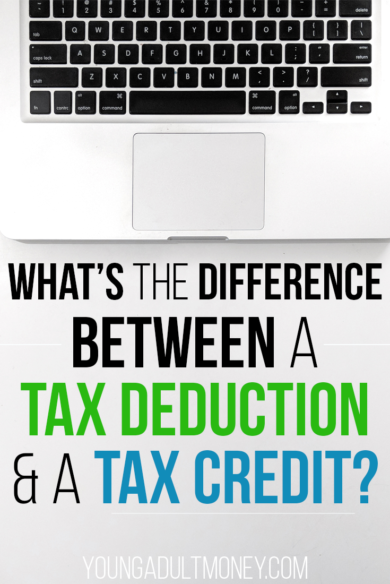 Taxes are one of the most complicated parts of being an adult.
Taxes are one of the most complicated parts of being an adult.
No one really teaches you how to do taxes – you’re just expected to know what you’re doing.
You may hear certain tax terms thrown around, but do you know what they really mean? If not, that’s okay! Taxes are complicated, but that’s where you can turn to online resources to help.
One of the most common (and often confused) tax terminologies include the tax credits and tax deductions. These both work to provide you with tax breaks, but they work differently. Here is everything you need to know about tax deductions, tax credits, and the difference between both.
What is a Tax Deduction?
Tax deductions work to lower your annual taxable income. By lowering your taxable income, you theoretically should owe less in taxes.
There are two different ways you can claim tax deductions. The first option is to claim the standard deduction. Any taxpayer can automatically claim this deduction, which is dependent on your filing status. For instance, married couples who are filing a joint tax return are eligible for the largest standard deduction.
The second way you can claim deductions is to itemize each individual deduction. This means you will list out each individual expense you want to write off on your tax return. This is more tedious, but can prove very worthwhile if your deductible expenses are higher than the standard deduction.
Now, there are a few deductions you can only use if you choose to itemize your return. However, deductions like the student loan interest deduction are considered to be above-the-line deductions. This means you can claim this deduction even if you aren’t itemizing every deduction.
Other common tax deductions available for the 2018 tax year are listed below:
- Home office use
- Contributions to a traditional IRA
- Moving expenses to start a new job
- Charitable donations
- Medical related expenses
- Tuition and fees
- Mortgage loan interest
- Property tax
Remember, your ability to claim certain deductions is dependent on various qualifications, including your household income and filing status. You can check to see if you are qualified for a certain tax deduction by visiting the IRS’ website.
What is a Tax Credit?
Tax credits work to reduce the amount you owe in taxes. Unlike a tax deduction, which lowers your total taxable income, a tax credit is just that – a credit.
For instance, if you owe $4,000 in taxes but you qualify for a $1,500 tax credit, your total tax liability would be reduced to $2,500.
Clearly, tax credits can save you a significant amount of money when tax time rolls around. But what do you have to do to receive a tax credit?
To qualify for a tax credit, you must meet certain criteria, which is often based on your income, age, and filing status.
If you are eligible to claim a tax credit, keep in mind that some credits are non-refundable. A non-refundable tax credit will not refund you if the credit brings your tax liability to a negative number. For example, if you are eligible for a $1,500 tax credit, but you only owe $1,000 in taxes, you would not be reimbursed for the additional $500 if it is a non-refundable credit.
Fortunately, there are many refundable tax credits available, which can put more money back in your pocket. Some refundable tax credits include the Additional Child Tax Credit, the Earned Income Tax Credit, Health Coverage Tax Credit, and the Small Business Health Care Tax Credit.
Lastly, it’s important to note that you cannot claim a tax credit and a deduction for the same qualified expense.
Is Either a Tax Deduction or a Tax Credit Better than the Other?
While both tax credits and deductions are helpful for saving you money during tax time, you may be wondering if one is better than the other. Generally, tax credits will go further to save you money because they reduce the overall amount that you may owe. A tax deduction can certainly help to save you money, but it won’t affect your bottom line as much as a tax credit will.
For instance, if you are in the 10% tax bracket and claim a $1,000 deduction, that only reduces your taxable income by $100. That’s certainly better than nothing (especially if you have multiple deductions to claim), but it’s no where near the benefit you will receive from a tax credit.
However, it’s still worthwhile to crunch the numbers on your own to ensure that you’re getting the best tax break available.
Related:
Tax season is a little ways away, but what are you doing now to prepare? Have you benefited from claiming a certain tax deduction or credit?


really interesting post, thanks for sharing!